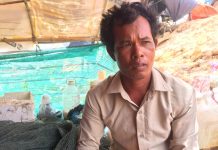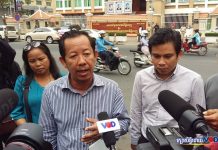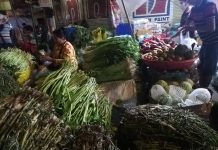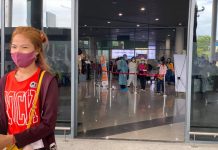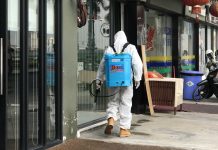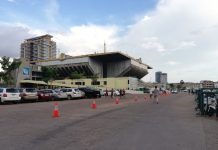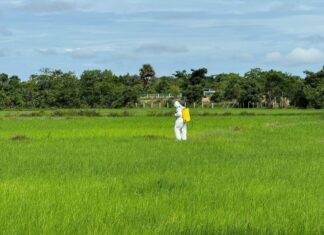ពលរដ្ឋក្នុងភូមិ១ ក្រុងព្រះសីហនុត្អូញត្អែរថា ក្រុមហ៊ុនឯកជនមួយធ្វើទំនប់ទប់ទឹកស្អុយមិនឲ្យហូរបណ្តាលឱ្យលិចផ្ទះពួកគេ
(ខេត្តព្រះសីហនុ)៖ បរិស្ថានក្រុងព្រះសីហនុបាននិងកំពុងស្តារ និងអភិវឌ្ឍន៍ឡើងវិញពីមួយថ្ងៃទៅមួយថ្ងៃ ប៉ុន្តែការវិនិយោគលើដីសមុទ្រ ការសង់អគារខ្ពស់ៗ នៅតែគគ្រឹកគគ្រេងដដែល។ ស្របពេលដែលការអភិវឌ្ឍក្នុងខេត្តជាប់មាត់សមុទ្រមួយនេះកំពុងបន្ត ប្រជាពលរដ្ឋមួយចំនួន ក្នុងភូមិ១ សង្កាត់លេខ១ ក្រុងព្រះសីហនុ បានត្អូញត្អែរថា ការធ្វើទំនប់របស់ក្រុមហ៊ុនអានកូ ទប់មិនឲ្យទឹកស្អុយហូរចូលសមុទ្រ បានធ្វើឱ្យលិចផ្ទះរបស់ពួកគេ អស់រយៈពេលបីឆ្នាំមកហើយ។
អ្នកស្រី ឈួន ផល្លី ពលរដ្ឋម្នាក់ដែលអះអាងថាផ្ទះរបស់អ្នកស្រីត្រូវលិចដោយសារការបិទទំនប់របស់ក្រុមហ៊ុនអានកូ ប្រាប់ Newsroom Cambodia កាលពីថ្ងៃទី១២ ខែសីហា...
កង្វះបង្គន់សាធារណៈ រំខានដល់អ្នកធ្វើដំណើរនៅតាមមាត់ទន្លេរាជធានីភ្នំពេញ
(ភ្នំពេញ): មាត់ទន្លេ រាជធានីភ្នំពេញ គឺជាទីមនោរម្យសម្រាប់មនុស្សម្នាដើរកំសាន្ត ស្រូបយកខ្យល់អាកាស និងធ្វើលំហាត់ប្រាណ ប៉ុន្តែពេលខ្លះអ្នកដើរលំហែរតាមផ្លូវត្រូវស្រូបយកក្លិនដែលបណ្តាលមកពីការបន្ទោរបង់តាមច្រាំងទន្លេ។
កំពុងអង្គុយនៅតាមច្រាំងនៃមាត់ទន្លេ ខាងមុខវត្តឧណ្ណាលោម លោក ថុល ចាន់ណារ៉ា អ្នកហាត់ប្រាណម្នាក់និយាយថា រាល់ពេលដែលលោករត់ហាត់ប្រាណ ពេលខ្លះខ្យល់បក់នាំក្លិនឆ្អេះ ជះពីច្រាំងទន្លេ និងបរិយាកាសនៅជុំវិញខ្លួនមិនល្អ។ លោកបន្តថាការណ៍នេះឲ្យលោកមានអារម្មណ៍មិនល្អ និងប៉ះពាល់ដល់ខ្យល់ដង្ហើម រហូតធ្វើឲ្យលោកលែងចង់មកហាត់ប្រាណនៅទីនោះទៀត។
បុរសដែលរស់នៅម្តុំផ្សារកណ្តាលរាជធានីភ្នំពេញរូបនេះបន្ថែមថា បង្គន់អនាម័យពីមួយកន្លែងទៅមួយកន្លែងឆ្ងាយពីគ្នារហូតដល់១គីឡូកន្លះទៅពីរគីឡូម៉ែត្រ ធ្វើឲ្យលោកពិបាកដើររកពេលលោកចង់ចូលបន្ទប់ទឹកម្តងៗ។
«ខ្ញុំពេលដឹងថាអត់ស្រួល ដើរទៅផ្ទះវិញ...
ជីគីមីមានផលប៉ះពាល់ច្រើន តែកសិករគ្មានជម្រើសដោយសារខ្វះជីធម្មជាតិ
ជីជាផ្នែកមួយសំខាន់សម្រាប់ការដាំដុះ បាចសាចទៅលើវាលស្រែ ដើម្បីឱ្យដំណាំស្រូវលូតលាស់ និងបានទិន្នផលល្អ។ ជីដែលកសិករនិយមប្រើប្រាស់ស្ទើរគ្រប់កន្លែងគឺជីគីមី ដោយសារងាយស្រួករកទិញ ងាយស្រួលដឹកជញ្ជូន និងមានតម្លៃថោក។ ជីអាចម៌សត្វ និងជីកំប៉ុស្តដែលអាចរកបានតាមផ្ទះ មិនគ្រប់គ្រាន់សម្រាប់ការផ្គត់ផ្គង់ដល់ការដាំដុះនោះទេ ដូច្នេះកសិករបានជ្រើសរើសយកការប្រើប្រាស់ជីគីមីដើម្បីបង្កើនទិន្នផល។
ប៉ុន្តែការប្រើប្រាស់ជីគីមីតែមួយមុខ ដោយគ្មានការលាយផ្សំពីជីធម្មជាតិ ឬជីសរីរាង្គផ្សេងទៀត ចំពោះវិស័យកសិកម្ម មិនត្រឹមតែធ្វើឱ្យខូចសុខភាពមនុស្ស សត្វនៅពេលអនាគត និងប៉ះពាល់ដល់ជីវៈចម្រុះប៉ុណ្ណោះទេ លើសពីនេះ ដោយសារការប្រើប្រាស់ជីគីមី ទើបធ្វើឱ្យដីកាន់តែខ្សត់ជីជាតិ កសិករចាំបាច់ត្រូវបង្កើនបរិមាណការប្រើប្រាស់ជីគីមីនៅឆ្នាំបន្ទាប់ដើម្បីរក្សាទិន្នផលឱ្យនៅថេរ។
កំពុងអង្គុយជជែកជាមួយកសិករផ្សេងទៀតលើកញ្ចុះខាងក្រោយផ្ទះ ក្នុងឃុំបាស្រែ ស្រុកអង្គរបុរី...
ប្រជានេសាទនៅបឹងតាមោកបារម្ភពីជីវភាព ខណៈបឹងនេះត្រូវលុបជាបន្តបន្ទាប់
(ភ្នំពេញ): ខណៈព្រះអាទិត្យកំពុងឡើងកម្តៅនៅម៉ោងប្រមាណជិត១១ថ្ងៃត្រង់ទៅហើយ បុរសសម្បុរសណ្តែកបាយ សក់រួញអង្គារដីម្នាក់ កំពុងអង្គុយពែនភ្នែននិយាយលេងជាមួយអ្នកជិតខាងក្រោមរោងសង់ពីឈើ និងឬស្សី ប្រក់ថង់កៅស៊ូនៅមាត់ទឹកនៃបឹងទំនប់កប់ស្រូវ ឬបឹងតាមោក រាជធានីភ្នំពេញ។
និយាយដោយបន្ថើរសំដីមួយៗ លោក យាំ ប្រុសពៅ ប្រាប់ថា លោកប្រកបរបរនេសាទនៅបឹងទំនប់កប់ស្រូវនេះអស់រយៈពេលជិត៦ឆ្នាំមកហើយ ដោយប្រើប្រាស់មង និងលបជាឧបករណ៍។
លោកបន្តទាំងទឹកមុខស្រងូតស្រងាត់ថា ដោយសារជីវភាពគ្រួសាររបស់លោកមានភាពលំបាក និងមានសមាជិកច្រើនជាក្មេងៗ និងពិបាកក្នុងការរកការងាធ្វើ ទើបលោកបន្តប្រកបរបរនេសាទនេះ ទោះបីជាប្រឈមនឹងគ្រោះថ្នាក់។
លោកថា៖ «បើមានការងារផ្សេងធ្វើ អាចដោះស្រាយជីវភាពក្នុងក្រុមគ្រួសារបាន ប្រហែលជាឈប់រកហើយ...
សង្គមស៊ីវិល១៤១ស្ថាប័ន ទាមទារឱ្យតុលាការដោះលែងលោក រ៉ុង ឈុន
(ភ្នំពេញ): សង្គមស៊ីវិលចំនួន១៤១ នៅសប្តាហ៍នេះ បានទាមទារឱ្យតុលាការដោះលែងលោក រ៉ុង ឈុន ដែលជាប្រធានសហភាពសហជីពកម្ពុជា បន្ទាប់ពីលោកត្រូវបានចាប់ខ្លួនទាំងយប់ ពាក់ព័ន្ធនឹងការអត្ថាធិប្បាយជុំវិញបញ្ហាព្រំដែនកម្ពុជា-វៀតណាម។
ក្នុងសេចក្តីថ្លែងការណ៍រួមចេញកាលពីថ្ងៃទី៣ ខែកក្កដា ដោយអង្គការសង្គមស៊ីវិលចំនួន១៤១ស្ថាប័ន រូមមានមជ្ឈមណ្ឌលសិទ្ធិមនុស្សកម្ពុជា អង្គការលីកាដូ និងអង្គការអាដហុកជាដើម បានស្នើទៅកាន់រដ្ឋាភិបាល និងសាលាដំបូងរាជធានីភ្នំពេញ ឱ្យដោះលែងប្រធានសហភាពសហជីពកម្ពុជា លោក រ៉ុង ឈុន។ណ សេចក្តីថ្លែងការណ៍នោះបន្ថែមថា ការចាប់ខ្លូននេះជាការរំលោភសិទ្ធិសេរីភាពក្នុងការបញ្ចេញមតិ ដែលត្រូវបានធានាដោយរដ្ឋធម្មនុញ្ញកម្ពុជា។
សេចក្តីថ្លែងការណ៍រួមនោះសរសេរថា៖ «យើងខ្ញុំជាក្រុមសង្គមស៊ីវិលដែលមានរាយនាមដូចខាងក្រោម...
Prisoners’ Families Worry About Conditions in Overcrowded Jails as Officials Acknowledge Rising Pressure From...
Prisoners’ families say they can spend up to hundreds of dollars a month trying to keep their relatives in overcrowded jails healthy — driving some families into debt — as officials acknowledge that the nationwide drug crackdown is putting heavy pressure on the country’s prisons and courts.
ក្រុមគ្រួសារអ្នកទោសបារម្ភពីសុខភាពក្នុងពន្ធនាគារដែលចង្អៀតណែន ខណៈមន្រ្តីរដ្ឋាភិបាលទទួលស្គាល់ការកើនឡើងសម្ពាធពីការបង្ក្រាបគ្រឿងញៀន
(ភ្នំពេញ): ក្រុមគ្រួសាររបស់អ្នកកំពុងជាប់ឃុំនិយាយថាពួកគេអាចចំណាយប្រាក់រាប់រយដុល្លារក្នុងមួយខែ ដើម្បីផាសុកភាពសាច់ញាតិរបស់ពួកគេនៅក្នុងពន្ធនាគារដែលមានភាពចង្អៀតណែន ស្របពេលមន្ត្រីរដ្ឋាភិបាលទទួលស្គាល់ថា ការបង្ក្រាបគ្រឿងញៀនទូទាំងប្រទេស កំពុងដាក់សម្ពាធយ៉ាងខ្លាំងទៅលើពន្ធនាគារ និងតុលាការរបស់ប្រទេសនេះ។
កាលពីខែមិថុនា អាជ្ញាធរបានប្រកាសអំពីការកើនឡើងនៃការចាប់ខ្លួនពាក់ព័ន្ធនឹងគ្រឿងញៀនសម្រាប់ឆមាសទី១នៃឆ្នាំនេះដោយអះអាងថា ការបិទក្លឹបកំសាន្ត និងរង្គសាលផ្សេងៗ ចំពេលផ្ទុះជំងឺកូវីដ១៩ ធ្វើឲ្យសមត្ថកិច្ចងាយស្រួលក្នុងការស្វែងរកមុខសញ្ញាអ្នកជួញដូរគ្រឿងញៀន ជាហេតុធ្វើឱ្យមានភាពចង្អៀតណែនក្នុងពន្ធនាគារ។
អ្នកស្រី កុល សាត ភរិយារបស់អ្នកជាប់ពន្ធនាគារនៅព្រៃស រាជធានីភ្នំពេញម្នាក់ និយាយថា ស្វាមីរបស់អ្នកស្រីដែលកំពុងជាប់ឃុំអស់រយៈពេលជាងមួយឆ្នាំមកហើយនោះ កំពុងមានជំងឺលើសឈាម។ អ្នកថា អ្នកស្រីបារម្ភថា ស្វាមីរបស់អ្នកស្រីនឹងមិនអាចរស់បានដោយសាររបបអាហារក្នុងពន្ធនាគារគ្មានស្តង់ដារ។
«ខ្ញុំទៅជួបគាត់ម្តងក្នុងមួយសប្តាហ៍ ដើម្បីផ្ញើរម្ហូប...
សង្គមស៊ីវិលចំនួន៨០ ស្នើរដ្ឋាភិបាលឲ្យដកសិទ្ធិក្រុមហ៊ុនឯកជនដែលអភិវឌ្ឍន៍កោះកុងក្រៅ
អង្គការសង្គមស៊ីវិលចំនួន៨០ បានអំពាវនាវទៅកាន់រដ្ឋាភិបាលឱ្យដកសិទ្ធិក្រុមហ៊ុនឯកជនមួយចេញពីការអភិវឌ្ឍនៅតំបន់កោះកុងក្រៅ ដោយថា ការអភិវឌ្ឍនោះមានការគំរាមគំហែងយ៉ាងធ្ងន់ធ្ងរដល់ធនធានធម្មជាតិ ។
សេចក្តីថ្លែងការណ៍រួមចេញផ្សាយថ្ងៃទី៣១ ខែកក្កដា របស់ក្រុមយុវជន ក្រុមសង្គមស៊ីវិល និងសហគមន៍ចំនួន៨០ស្ថាប័នរួមមាន ចលនាយុវជនមាតាធម្មជាតិ បណ្តាញយុវជនកម្ពុជា និងអង្គការលីកាដូជាដើម បានស្នើរទៅកាន់រដ្ឋាភិបាលកម្ពុជាឱ្យដកសិទ្ធិក្រុមហ៊ុនអេស អ៊ី ហ្ស៊ិត ខូអិលធីឌី (KOH KONG S E ZCO., LTD.) ចេញពីការអភិវឌ្ឍន៍នៅតំបន់កោះកុងក្រៅទាំងមូល។
ក្នុងសេចក្តីថ្លែងការណ៍នោះសរសេរថា៖ «ការផ្ដល់សិទ្ធិឱ្យទៅក្រុមហ៊ុនមួយនេះដើម្បីអភិវឌ្ឍន៍កោះកុងក្រៅ...
ការប្រើជីគីមីច្រើនហួសកម្រិតធ្វើឲ្យប៉ះពាល់ដល់គុណភាពដី និងសុខភាពមនុស្ស
ការប្រើប្រាស់ជីគីមីច្រើនហួសកម្រិត និងការបំផ្លាញសត្វល្អិតក្នុងដី ធ្វើឲ្យដីខូចគុណភាពមិនអាចដាំដុះកើត និងប៉ះពាល់សុខភាពអ្នកដាំ និងអ្នកបរិភោគយ៉ាងធ្ងន់ធ្ងរ ក្នុងពេលបច្ចុប្បន្ន និងទៅអនាគត។ នេះបើតាមការលើកឡើងរបស់អ្នកជំនាញ។
លោក សម វិទូ ទីប្រឹក្សាឯករាជ្យ និងជាប្រធានពិគ្រោះយោបល់ផ្លាសអេជ្ជ លើកឡើងថា ការប្រើគីមីច្រើនលើដី និងការមិនផ្តល់សារធាតុសរីរាង្គទៅដីវិញ ធ្វើឲ្យដីងាប់ ដែលមិនអាច ផ្តល់ជីវជាតិអ្វីទៀតដល់រុក្ខជាតិ។ ចំណែកថ្នាំពុលគីមី គឺជាគីមីសំយោគមិនងាយរលាយក្នុងធម្មជាតិ ប៉ុន្តែកសិករស្ទើរតែទាំងអស់ប្រើជីគីមី ជីបំប៉នដីទ្រាប់បាត និងប្រើថ្នាំសម្លាប់សត្វល្អិតផ្សេងៗដើម្បីធ្វើឲ្យដំណាំឆាប់ធំ ដោយខុសបច្ចេកទេស។...
រយៈពេលបួនខែ ពលករកម្ពុជាជាង១០ម៉ឺននាក់បានត្រឡប់មកកម្ពុជាវិញក្នុងអំឡុងកើតមានជំងឺកូវីដ
(ភ្នំពេញ)៖ ពលករកម្ពុជាជាង១០ម៉ឺននាក់ ដែលចំណាកស្រុកទៅធ្វើការនៅក្រៅប្រទេស បានវិលត្រឡប់មកកម្ពុជាវិញ ក្រោយប្រទេសទាំងនោះកំពុងរិតបន្តឹង ឬបិទប្រទេស ដើម្បីកាត់បន្ថយការឆ្លងជំងឺកូវីដ១៩។ នេះបើតាមការបញ្ជាក់របស់លោក ស ខេង រដ្ឋមន្ត្រីក្រសួងមហាផ្ទៃ និងជាប្រធានគណៈកម្មាធិការជាតិ ប្រយុទ្ធប្រឆាំងអំពើជួញដូរមនុស្ស។
លោក ស ខេង ថ្លែងបែបនេះក្នុងសិក្ខាសាលាពិគ្រោះយោបល់ថ្នាក់ជាតិលើកទី២ ស្តីពីកតិកាសញ្ញាពិភពលោកសម្រាប់ទេសន្តរប្រវេសន៍ដោយសុវត្ថិភាព រៀបរយ និងស្របច្បាប់ កាលពីថ្ងៃទី៣០ ខែកក្កដា។
លោកលើកឡើងថា ចាប់ពីថ្ងៃទី២១ ខែមីនា...
អ្នកសេដ្ឋកិច្ចបារម្ភថា កម្ពុជាអាចខាតបង់ច្រើនជាងចំណេញក្នុងការចុះកិច្ចព្រមព្រៀងពាណិជ្ជកម្មសេរីជាមួយចិន
(ភ្នំពេញ): អ្នកជំនាញផ្នែកសេដ្ឋកិច្ចលើកឡើងថា កម្ពុជានឹងខាតបង់ប្រយោជន៍ជាច្រើនប្រសិនបើមិនមានគោលនយោបាយច្បាស់លាស់ក្នុងដំណើរការធ្វើពាណិជ្ជកម្មសេរី បន្ទាប់ពីការចុះកិច្ចព្រមព្រៀងពាណិជ្ជកម្មសេរីជាមួយប្រទេសចិន។
មន្រ្តីរដ្ឋាភិបាលប្រកាសថា កិច្ចព្រមព្រៀងពាណិជ្ជកម្មសេរីរវាងកម្ពុជា-ចិន ទើបនឹងត្រូវបានបិទបញ្ចប់សព្វគ្រប់នូវដំណាក់ការចរចាតាក់តែង ដែលត្រូវចំណាយពេល៦ខែ ហើយប្រទេសទាំងពីរគ្រោងនឹងចុះហត្ថលេខាជាផ្លូវការ នៅខែសីហាខាងមុខ។
លោក ឆេង គឹមឡុង នាយកមជ្ឈមណ្ឌលនវានុវត្តន៍ផ្នែកអភិបាលកិច្ច និងប្រជាធិបតេយ្យរបស់វិទ្យាស្ថានចក្ខុវិស័យអាស៊ី លើកឡើងថា ការចុះកិច្ចព្រមព្រៀងពាណិជ្ជកម្មសេរីជាមួយចិន កម្ពុជាអាចនឹងរងផលប៉ះពាល់ដល់ការនាំចូលផលិតផលពីប្រទេសចិនច្រើនលើសលប់ ដែលជាហេតុអាចធ្វើឲ្យសេដ្ឋកិច្ចកម្ពុជាធ្លាក់ចុះ។ លោកបន្តថា ការចុះកិច្ចព្រមព្រៀងនេះ មិនសូវជាផ្តល់ផលចំណេញដល់កម្ពុជាប៉ុន្មាននោះទេ តែលោកថា វាជាការព្រួយបារម្ភពីការនាំចូលផលិតផលច្រើនសន្ធឹកសន្ធាប់ពីប្រទេសចិន ខណៈដែលច្រកពាណិជ្ជកម្មបើក ហើយការនាំចូលផលិតផលនានា...
ទោះបីមានសុទិដ្ឋិនិយមពីសន្ទុះនៃសេដ្ឋកិច្ច តែអ្នកវិភាគលើកឡើងថា ការងើបឡើងវិញនៃសេដ្ឋកិច្ចកម្ពុជាត្រូវចំណាយពេលមិនតិចជាង១២ខែទៀត
ក្រុមអ្នកសេដ្ឋកិច្ចបានលើកឡើងថា កម្ពុជាអាចចំណាយពេលយ៉ាងហោចណាស់រហូតដល់ចុងឆ្នាំ២០២១ ដើម្បីស្តារសេដ្ឋកិច្ចប្រទេសនេះឡើងវិញពីផលប៉ះពាល់នៃជំងឺកូវីដ ខណៈដែលអ្នកដែលគ្មានការងារធ្វើជាច្រើន ទំនងជាជួបផលលំបាកក្នុងការស្វែងរកការងារ និងការសម្របខ្លួនទៅនឹងការពិតថ្មីនេះ។
សង្គមស៊ីវិលថា ការតែងតាំងកូនប្រុសរដ្ឋមន្ត្រីក្រសួងអភិវឌ្ឍន៍ជនបទ ជារដ្ឋលេខាធិការក្រសួងតែមួយ បង្ហាញពីកង្វះតម្លាភាព
(ភ្នំពេញ)៖ បន្ទាប់ពីសារព័ត៌មានក្នុងស្រុកមួយចំនួនបានផ្សព្វផ្សាយអំពីការតែងតាំងកូនប្រុសរបស់លោក អ៊ុក រ៉ាប៊ុន រដ្ឋមន្ត្រីក្រសួងអភិវឌ្ឍន៍ជនបទ ធ្វើជារដ្ឋលេខាធិការក្នុងក្រសួងជាមួយគ្នា ត្រូវបានអ្នកឃ្លាំមើលសង្គមយល់ឃើញថា នេះជាការបង្ហាញអំពីកង្វះតម្លាភាពក្នុងការតែងតាំងមន្រ្តី ក្នុងជួររដ្ឋាភិបាល។
ក្នុងព្រះរាជក្រឹត្យចុះថ្ងៃទី២៣ ខែកក្កដា ព្រះមហាក្សត្របានតែងតាំងលោក អ៊ុក ពញ្ញា ជារដ្ឋលេខាធិការក្រសួងអភិវឌ្ឍន៍ជនបទ។ សារព័ត៌មានក្នុងស្រុកមួយចំនួនបានផ្សាយថា រដ្ឋលេខាធិការថ្មីរូបនេះត្រូវជាកូនប្រុរសរបស់លោក អ៊ុក រ៉ាប៊ុន ដែលមានតូនាទីជារដ្ឋមន្រ្តីនៃក្រសួងមួយនេះផ្ទាល់។
ប្រធានកម្មវិធីនៃអង្គការតម្លាភាពកម្ពុជា លោក អ៊ឹម នរិន្ទ លើកឡើងថា ការដាក់បញ្ចូលក្រុមគ្រួសាររបស់មន្រ្តីខ្លួនឯងក្នុងជួររដ្ឋាភិបាល...
ទាហានមួកខៀវ អ.ស.ប. ៤នាក់ ក្នុងចំណោម៨០នាក់ ដែលត្រឡប់ពីប្រទេសម៉ាលី រកឃើញមានជំងឺកូវីដ១៩
(ភ្នំពេញ)៖ ក្រុមទាហានមួកខៀវអង្គការសហប្រជាជាតិចំនួនបួននាក់ ក្នុងចំណោម៨០នាក់ ដែលត្រឡប់មកពីប្រទេសម៉ាលី រកឃើញមានផ្ទុកវិជ្ជមានជំងឺកូវីដ១៩ បន្ទាប់ពីពួកគេមកដល់កម្ពុជាកាលពីថ្ងៃ១០ ខែកក្កដា និងកំពុងត្រូវបានដាក់ឲ្យនៅដាច់ដោយឡែក។ នេះបើតាមសេចក្តីជូនដំណឹងរបស់ក្រសួងសុខាភិបាលកម្ពុជា។
សេចក្តីជូនដំណឹងរបស់ក្រសួងសុខាភិបាលកម្ពុជាចេញនៅថ្ងៃទី២៩ ខែកក្កដា នេះបញ្ជាក់ថា នៅថ្ងៃទី២៨ ខែកក្កដា ក្រសួងសុខាភិបាលបានរកឃើញអ្នកឆ្លងជំងឺកូវីដ១៩ចំនួន៧នាក់ ក្នុងនោះ៤នាក់ មកពីប្រទេសម៉ាលី និង៣នាក់ទៀតមកពីប្រទេសឥណ្ឌូនេស៊ី។ ក្រសួងបន្ថែមថា បុរស៤នាក់ដែលមកពីប្រទេសម៉ាលី គឺជាក្រុមទាហានមួកខៀវអង្គការសហប្រជាជាតិ ដែលទើបត្រឡប់មកដល់កម្ពុជាវិញកាលពីថ្ងៃទី១០ ខែកក្កដា ជាមួយទាហានមួកខៀវចំនួន៧៦នាក់ទៀត។
ក្រសួងបញ្ជាក់ថា៖ «ពួកគាត់ជាក្រុមមួកខៀវអង្គការសហប្រជាជាតិ...
ក្រសួងសុខាភិបាល៖ ការមើលរំលងការចម្លងវីរុសកូរ៉ូណា គឺជាគ្រោះថ្នាក់បំផុតសម្រាប់ថ្ងៃឈប់សម្រាកខាងមុខ
(ភ្នំពេញ)៖ ក្រសួងសុខាភិបាល បន្តអំពាវនាវឱ្យប្រជាពលរដ្ឋទាំងអស់ អនុវត្តការការពារជំងឺកូវីដ១៩ឱ្យបានខ្ជាប់ខ្ជួន ជាពិសេសនៅថ្ងៃឈប់សម្រាកចំនួន០៥ថ្ងៃខាងមុខ បើទោះបីកម្ពុជាមិនទាន់មានករណីឆ្លងក្នុងសហគមន៍។
កាលពីថ្ងៃទី១៧ ខែកក្កដា កន្លងទៅនេះ ក្រសួងសុខាភិបាល ជូនដំណឹងដល់សាធារណៈជន សម្រាប់ថ្ងៃឈប់សម្រាកចំនួន០៥ថ្ងៃ គឺនៅថ្ងៃទី១៧ ដល់ថ្ងៃទី២១ ខែសីហា ឆ្នាំ២០២០ ដែលជាការឈប់សម្រាក ដើម្បីសងថ្ងៃឈប់សម្រាកការងាររបស់មន្ត្រីរាជការ និយោជិត កម្មករ ក្នុងពិធីបុណ្យចូលឆ្នាំថ្មីប្រពៃណីជាតិ បន្ទាប់ពីរដ្ឋាភិបាលបានលើកការឈប់សម្រាក កាលពីថ្ងៃទី១៣ ដល់ថ្ងៃទី១៦ ខែមេសា...
Olympic Stadium Reopens to the Public
Olympic Stadium will immediately be reopened to the public, allowing exercise on its grounds, the Ministry of Education, Youth and Sport announced today.





